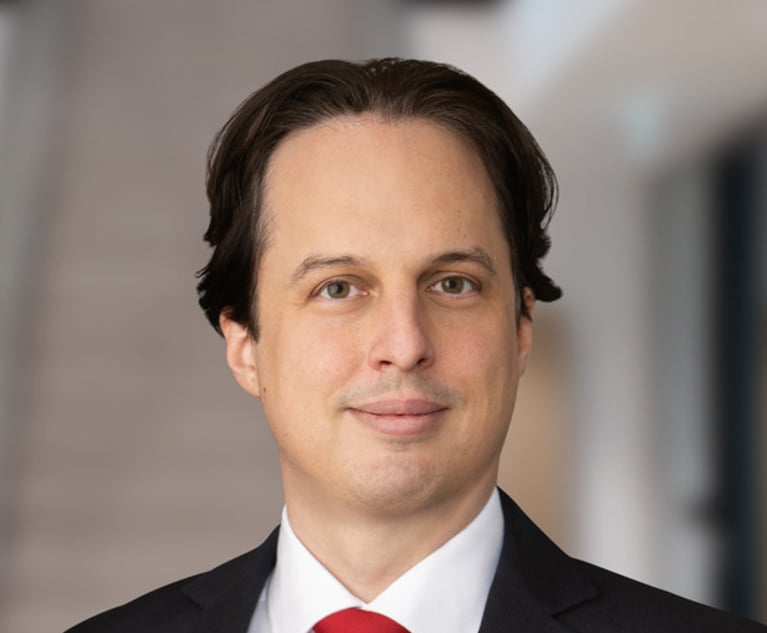Cleary Gottlieb Latin America Team Busy Advising From Remote Offices Amid Flood of Client Concerns
The region is considered four weeks behind the U.S. on the spread of COVID-19.
March 23, 2020 at 01:59 PM
5 minute read
 Photo: Diego M. Radzinschi/ALM
Photo: Diego M. Radzinschi/ALM
Lawyering has become more intense over the past week for the Cleary Gottlieb Steen & Hamilton team focused on Latin America, as all 16 of the firm's global offices adopt a remote work policy.
Teens blow into trumpets in the middle of Zoom meetings. Children wander into home offices asking for lunch. Associates who live alone grapple with isolation. And the demand for advice seems never-ending.
"I'm going from morning to late at night, talking across the firm and with clients," said Jeff Lewis, a New York-based partner who has worked in Latin America for decades. "The workday has almost become more intense for me."
Clients are seeking advice on a host of topics related to the new coronavirus. They want to know how the pandemic will impact existing financing arrangements, supply and purchase agreements, or whether it will qualify as a force majeure event that prevents a party from fulfilling a contract.
Some clients are starting to think about whether they need to restructure their capital structure and operations. And governments across Latin America are preparing to handle a wide array of pressing issues. The region is considered to be about a month behind the U.S. in terms of transmissions of COVID-19.
"Governments across Latin America and across the world are going to face challenges that we haven't seen in our lifetimes," Lewis said.
Cleary Gottlieb's Latin America practice has over 120 lawyers covering banking and finance, capital markets and corporate/mergers and acquisitions in the region. The firm advises more than 20 Latin American foreign private issuers in connection with U.S. Securities and Exchange reporting obligations.
"After 9/11 and Hurricane Sandy, we're used to being displaced. Everyone can be a trooper," said Chantal Kordula, a New York-based partner whose practice focuses primarily on transactions in Latin America.
Kordula said she has hunkered down in upstate New York for the time being.
Clients in the travel, hospitality and retail sectors have been actively seeking out advice because they're experiencing the most immediate impact from the global spread of COVID-19. There are also a handful of Cleary Gottlieb clients who have liquidity and are looking to invest in this climate—companies with strong long-term prospects that want to make strategic purchases.
One industry that has not been negatively impacted is food distribution, said Kordula. The challenge there is to make sure supply chains and production plants keep running.
That could be difficult in countries that have shut borders or ordered their citizens to self-quarantine. The reactions to the virus have varied widely across Latin America, with Argentina and Peru blocking foreign arrivals and ordering quarantines while the two largest economies—Brazil and Mexico—remain reluctant to restrict movement.
Lewis said that larger companies have revolvers in place to help them through liquidity crunches, and that banks continue to lend money. Kordula said a Mexican client is currently refinancing existing debt.
Kordula says clients in Mexico worry that their government is still not taking the pandemic as seriously as they'd like. "If the virus really starts to spread, they really don't have the resources to handle the influx of people to the hospitals," she said.
Mexico City Mayor Claudia Sheinbaum acknowledged Sunday that the capital is already facing water shortages, with some neighborhoods relying on trucks to bring in water. She has ordered cinemas and gyms in the capital to close starting Monday, but will allow shopping malls and restaurants to remain open.
One in seven Mexicans live in Mexico City or its surrounding suburbs, some of which are densely inhabited slums. More than half of Mexicans work in the cash economy with no formal job protections. Those who can stay home in the country have largely done so voluntarily in recent days.
A growing number of companies in Latin America—from car makers to coffee shops—have reduced production and staffing to enforce social isolation and also in response to lower demand for their goods and services.
Alsea, which operates such brands as Starbucks Coffee and Domino's Pizza across Latin America, last week offered its 41,500 Mexican employees 30 days of unpaid leave to cope with falling foot traffic in its restaurants.
Chile-based LATAM Airlines has suggested its unionized workers take a 50% payout for the next three months.
For industry, well-written contracts between parties are paramount in these tough times, says Kordula. This could mean having drafted—or drafting—contracts that specifically mention health epidemics or are written broadly enough to clearly include such events. Also, the facts and circumstances matter in payment disputes.
A purchaser may be able to renege on buying raw materials, for instance, if a government has forced the company to shutter operations. But in take-or-pay agreements, purchasers have committed to compensating suppliers for all of their production, regardless of unfavorable market conditions. Economic hardship is not a force majeure event.
"At some point, everything will become linked to the pandemic," said Kordula.
NOT FOR REPRINT
© 2025 ALM Global, LLC, All Rights Reserved. Request academic re-use from www.copyright.com. All other uses, submit a request to [email protected]. For more information visit Asset & Logo Licensing.
You Might Like
View All

Kim & Chang, Freshfields, A&O Shearman Take Top Spots for Highest Collective Deal Value as APAC M&A Grew By Just 1% in 2024

Another Partner Exits Deloitte Legal—Former M&A Head Joins UK Top 50 Law Firm

KPMG Law US Targets Alternative Business Licence, Shaking Up Legal Status Quo
3 minute readLaw Firms Mentioned
Trending Stories
- 1With Florida’s Lateral Hiring Remaining Steady in 2024, Here’s the Top Hires Throughout the State
- 2Capital Markets Partner Rejoins O’Melveny Ahead of Expected Uptick in Demand
- 3Pharma Company Faces Breach-of-Contract Claim Over $1.3 Million in Unpaid Invoices
- 4KPMG Law Seeks Alternative Business License, Shaking Up Legal Status Quo
- 5Pittsburgh's Reed Smith, K&L Gates Join Fight to Save Nippon Steel-U.S. Steel Merger
Who Got The Work
Michael G. Bongiorno, Andrew Scott Dulberg and Elizabeth E. Driscoll from Wilmer Cutler Pickering Hale and Dorr have stepped in to represent Symbotic Inc., an A.I.-enabled technology platform that focuses on increasing supply chain efficiency, and other defendants in a pending shareholder derivative lawsuit. The case, filed Oct. 2 in Massachusetts District Court by the Brown Law Firm on behalf of Stephen Austen, accuses certain officers and directors of misleading investors in regard to Symbotic's potential for margin growth by failing to disclose that the company was not equipped to timely deploy its systems or manage expenses through project delays. The case, assigned to U.S. District Judge Nathaniel M. Gorton, is 1:24-cv-12522, Austen v. Cohen et al.
Who Got The Work
Edmund Polubinski and Marie Killmond of Davis Polk & Wardwell have entered appearances for data platform software development company MongoDB and other defendants in a pending shareholder derivative lawsuit. The action, filed Oct. 7 in New York Southern District Court by the Brown Law Firm, accuses the company's directors and/or officers of falsely expressing confidence in the company’s restructuring of its sales incentive plan and downplaying the severity of decreases in its upfront commitments. The case is 1:24-cv-07594, Roy v. Ittycheria et al.
Who Got The Work
Amy O. Bruchs and Kurt F. Ellison of Michael Best & Friedrich have entered appearances for Epic Systems Corp. in a pending employment discrimination lawsuit. The suit was filed Sept. 7 in Wisconsin Western District Court by Levine Eisberner LLC and Siri & Glimstad on behalf of a project manager who claims that he was wrongfully terminated after applying for a religious exemption to the defendant's COVID-19 vaccine mandate. The case, assigned to U.S. Magistrate Judge Anita Marie Boor, is 3:24-cv-00630, Secker, Nathan v. Epic Systems Corporation.
Who Got The Work
David X. Sullivan, Thomas J. Finn and Gregory A. Hall from McCarter & English have entered appearances for Sunrun Installation Services in a pending civil rights lawsuit. The complaint was filed Sept. 4 in Connecticut District Court by attorney Robert M. Berke on behalf of former employee George Edward Steins, who was arrested and charged with employing an unregistered home improvement salesperson. The complaint alleges that had Sunrun informed the Connecticut Department of Consumer Protection that the plaintiff's employment had ended in 2017 and that he no longer held Sunrun's home improvement contractor license, he would not have been hit with charges, which were dismissed in May 2024. The case, assigned to U.S. District Judge Jeffrey A. Meyer, is 3:24-cv-01423, Steins v. Sunrun, Inc. et al.
Who Got The Work
Greenberg Traurig shareholder Joshua L. Raskin has entered an appearance for boohoo.com UK Ltd. in a pending patent infringement lawsuit. The suit, filed Sept. 3 in Texas Eastern District Court by Rozier Hardt McDonough on behalf of Alto Dynamics, asserts five patents related to an online shopping platform. The case, assigned to U.S. District Judge Rodney Gilstrap, is 2:24-cv-00719, Alto Dynamics, LLC v. boohoo.com UK Limited.
Featured Firms
Law Offices of Gary Martin Hays & Associates, P.C.
(470) 294-1674
Law Offices of Mark E. Salomone
(857) 444-6468
Smith & Hassler
(713) 739-1250






